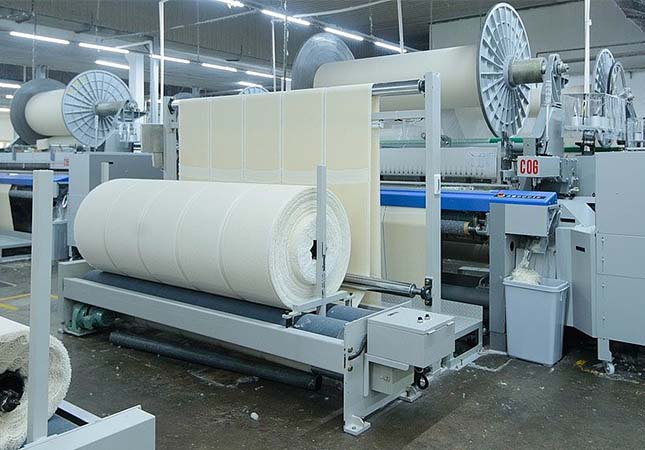Future Of The Textile Machinery Industry
The textile industry is undergoing a profound transformation, driven by the emergence of smart fabrics, 3D printed clothing, heightened demand from the hygiene sector, and the rise of eco-friendly textiles. These advancements have completely reshaped the industry, rendering it unrecognizable compared to just a few years ago. With its dynamic nature, the textile industry presents significant challenges. However, these challenges are being addressed through close collaboration between textile companies and their technology providers. By combining their creative forces and working in synergy, these sectors continuously develop new textile products and explore novel applications. As a result, textile machinery manufacturers worldwide are well-prepared to tackle the future obstacles by engaging in daily collaborations with their customers and offering them technological solutions that pave the way for increasingly innovative products.

Digital Transformation
In the past, textile machinery manufacturers relied on ITMA as the platform to introduce their latest technological advancements. However, the landscape has changed, and manufacturers in the industry are now actively developing innovative solutions to enhance both product and process sustainability while embracing digitization in production processes. The forthcoming ITMA trade show promises to showcase groundbreaking machinery that can effectively reduce production costs and minimize the consumption of water and other vital resources. Furthermore, exhibitors at ITMA will present a plethora of digitized solutions, empowering textile companies to achieve heightened production efficiency and streamline their operations.
ACIMIT has introduced the DIGITAL READY certification as a valuable tool strategically crafted to streamline the production process. It achieves this by establishing a common language and unified data reading system that enables seamless communication between various types of machinery and their corresponding production systems. This certification brings forth numerous benefits for customers, including the ability to effortlessly collect and integrate production data, analyze key production performance indicators, exert control over the entire product life cycle, and make informed business decisions with confidence and speed. By embracing the DIGITAL READY certification, customers gain the opportunity to unlock greater operational efficiency and capitalize on valuable insights.
Future Growth of the Textile Machinery Industry
In the coming years, we can expect significant growth in the realm of innovative textiles, particularly in sectors such as automotive, construction, and medical industries. This growth will be accompanied by an increased focus on recycling processes, driven by the growing environmental concerns associated with the textile industry. Additionally, the nonwovens sector, especially in disposable products for personal hygiene and medical applications, is poised for considerable expansion.
The Swiss Textile Machinery Association serves as the representative body for Switzerland's textile machine producers, component manufacturers, and service providers. While the current membership of 43 companies may not appear extensive, these Swiss firms offer comprehensive solutions across the entire textile value chain. Their expertise spans spinning, winding, weaving, knitting, finishing, nonwovens, embroidery, and quality control, encompassing a cumulative experience of over 4,000 years in textile machinery, components, and services. This rich heritage positions them excellently to confront the challenges of the global industry with confidence and competence.
Industry Trends
As the global population's purchasing power continues to rise each year, there is an accompanying disproportionate increase in textile production. However, this surge in production poses significant challenges in terms of sustainability and the transition towards a circular economy. The optimal utilization of resources is a crucial aspect of sustainability, considering the scarcity of raw materials, the value of water, and the cost of energy. Therefore, it is imperative that machinery and solutions become more efficient across all aspects.
Recognizing the importance of sustainability, the European Union has initiated a strategy for sustainable textiles. Swiss companies have wholeheartedly embraced the goals of this initiative, with the Swiss Textile Machinery Association prioritizing "sustainability" at the forefront of its agenda. Currently, the association is actively developing an individual program tailored for its member companies. While some members are already advanced in this area, others will undoubtedly benefit from these sustainability-focused efforts.
Additionally, there is a growing trend of digitalization in the textile industry. The availability of data presents diverse opportunities, ranging from product and process optimization to the development of entirely new business models. Swiss textile machinery companies are leveraging these possibilities to maximize customer benefits and assist their partners in transitioning to intelligent manufacturing.
Addressing sustainability concerns and embracing digitalization are pivotal for the textile industry's future, allowing for resource efficiency, innovative business models, and enhanced customer value.
Among disrupted supply chains and uncertainties in the global oil and gas markets, the significance of energy and resources has never been more pronounced. In countries like Germany, the growing portion of our power consumption is generated by modern wind turbines, with their composite rotor blades produced using German textile machines such as warp knitting and braiding machines. These innovations within the textile machinery industry serve as the foundation for intelligent applications and products, facilitating advancements in various sectors.
Energy efficiency is not just about generation, but also about conservation. A team of experts from member companies of the VDMA Textile Machinery Association has conducted an extensive study on energy-saving measures throughout the production chain of five textile products: cotton T-shirts, functional T-shirts, textile billboards, architectural fabrics, and hygienic nonwovens. The findings reveal that today's technologies offered by VDMA member companies can achieve energy savings of up to 30% compared to those available a decade or two ago. Remarkable progress has already been made in enhancing energy efficiency, as well as in optimizing the use of raw materials like cotton and water. This optimization of machinery, components, and technologies serves as a crucial catalyst for achieving energy and resource-efficient manufacturing processes. Notably, sustainability and automation emerge as two pivotal trends shaping the textile manufacturing industry.
In summary, the textile machinery industry plays a vital role in addressing energy generation, resource utilization, and energy efficiency concerns. With innovations in composite materials and a keen focus on sustainability, the sector is driving intelligent applications, paving the way for more efficient and environmentally conscious textile manufacturing processes.
Comments
Post a Comment